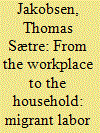| Srl | Item |
| 1 |
ID:
181898


|
|
|
|
|
| Summary/Abstract |
This article reveals the malleability of the boundaries between political and analytical categories related to internal migration in China. The author analyses the iterative process of categorisation, which, far from being neutral, settled, and objective, comes within government intervention strategies. Statistical categories, media practices, and the scientific understanding of migration by social sciences all dovetail with each other, showing themselves to be subject to evolving political, economic, and urban landscapes. This paper shows that the categories of spatial mobility do not correspond to those of urban integration, with implications that are not only of an administrative, material, and spatial nature but also concern identity issues.
|
|
|
|
|
|
|
|
|
|
|
|
|
|
|
|
| 2 |
ID:
159154


|
|
|
|
|
| Summary/Abstract |
Working class studies on China commonly use the lens of proletarianization to understand class formation among peasant workers who move into cities to work in China’s manufacturing sector. However, in the decade since the 2008 global financial crisis, proletarianization is an increasingly fading possibility for the Chinese peasantry, as urban labor markets remain saturated. Instead of peasants being transformed into proletariats, new patterns of class formation have emerged, where the interconnections between agrarian and urban remain central to peasant-workers living without dispossession. The Marxist feminist centering of practices and social arrangements of social reproduction, i.e. workforce maintenance, provides a welcome point of departure for redrawing some of our class maps in the shadow of the 2008 global economic crisis. This contribution draws on multi-sited ethnographic research among migrant workers toiling in the petty-commodity workplaces of Kunming, and in the adjacent countryside of Yunnan Province, to document the fluid class formation among families living on labor’s frontier. Through examining different experiences of workforce reproduction for families and migrant laborers as they move in and out of the workforce and household self-provisioning for subsistence, alternative imaginations for the possibilities of subsistence autonomy emerge.
|
|
|
|
|
|
|
|
|
|
|
|
|
|
|
|